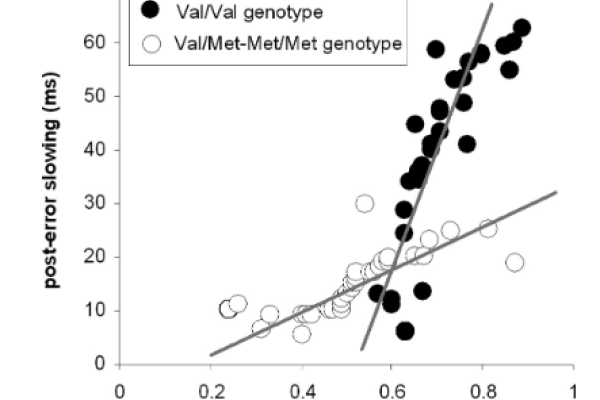2010-08-11

Behavioural adaptation depends on the recognition of response errors and processing of this error-information. Error processing is a specific cognitive function crucial for behavioural adaptation. Even though synchronization processes are important in information processing, its role and neurobiological foundation in behavioural adaptation are not understood. The brain-derived-neurotrophic-factor (BDNF) strongly modulates the establishment of neural connectivity that determines neural network dynamics and synchronization properties. Therefore altered synchronization processes may constitute a mechanism via which BDNF affects processes of error-induced behavioural adaptation. We investigate how variants of the BDNF gene regulate EEG-synchronization processes underlying error processing. Subjects (N=65) were genotyped for the functional BDNF Val66Met polymorphism (rs6265). We show that Val/Val genotype is associated with stronger error-specific phase-locking, compared to Met allele carriers. Post-error behavioural adaptation seems to be strongly dependent on these phase-locking processes and efficacy of EEG-phase-locking-behavioural coupling was genotype dependent. After correct responses, neurophysiological processes were not modulated by the polymorphism, underlining that BDNF becomes especially necessary in situations requiring behavioural adaptation. The results suggest that alterations in neural synchronization processes modulated by the genetic variants of BDNF Val66Met may be the mechanism by which cognitive functions are affected.
Behavioural adaptation depends on the recognition of response errors and processing of this error-information. Error processing is a specific cognitive function crucial for behavioural adaptation. Even though synchronization processes are important in information processing, its role and neurobiological foundation in behavioural adaptation are not understood. The brain-derived-neurotrophic-factor (BDNF) strongly modulates the establishment of neural connectivity that determines neural network dynamics and synchronization properties. Therefore altered synchronization processes may constitute a mechanism via which BDNF affects processes of error-induced behavioural adaptation. We investigate how variants of the BDNF gene regulate EEG-synchronization processes underlying error processing. Subjects (N=65) were genotyped for the functional BDNF Val66Met polymorphism (rs6265). We show that Val/Val genotype is associated with stronger error-specific phase-locking, compared to Met allele carriers. Post-error behavioural adaptation seems to be strongly dependent on these phase-locking processes and efficacy of EEG-phase-locking-behavioural coupling was genotype dependent. After correct responses, neurophysiological processes were not modulated by the polymorphism, underlining that BDNF becomes especially necessary in situations requiring behavioural adaptation. The results suggest that alterations in neural synchronization processes modulated by the genetic variants of BDNF Val66Met may be the mechanism by which cognitive functions are affected.